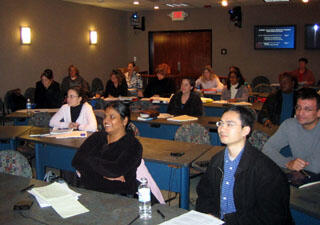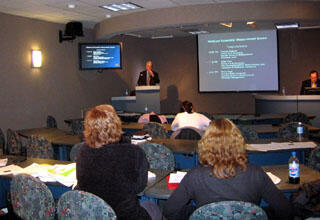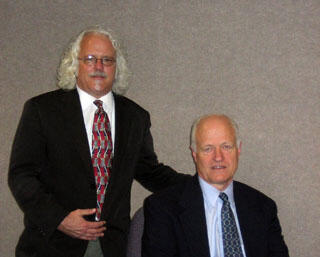April 3, 2007
CARMA program attracts noted scholars and interest in VCU
Share this story



A group of students and faculty gathered recently in a classroom in the Cabell Library at Virginia Commonwealth University to hear Neal Schmitt, University Distinguished Professor of Psychology and Management at Michigan State, deliver a lecture titled “Item Response Theory.”
Simultaneously, students and faculty at more than 70 other universities across the United States and abroad were also settling in to hear Schmitt, a well-known expert in his field. They would be viewing Schmitt’s hour-long lecture by webcast. At the end of the lecture, Schmitt would take questions delivered by email to the front of the classroom at VCU.
The far-reaching access of Schmitt’s lecture was made possible by the Center for the Advancement of Research Methods and Analysis (CARMA), a non-profit unit of VCU’s School of Business. The CARMA Consortium Webcast Program hosts a series of lectures each year that provide advanced training in research methods and data analysis to each of the universities that has signed up for the consortium. The participating lecturers are typically renowned experts whose areas of study are highly specialized.
“Many universities do not have direct access to some of these particular types of expertise,” said Larry Williams, University Professor of Management at VCU and the founder and director of CARMA. “With this program, we can bring it to them.”
Williams developed the CARMA webcast program because he “believed the available technology could meet a need that wasn’t being met by traditional means.” Prior to the CARMA webcasts, experts could travel to various schools and lecture on certain topics, but they were not efficiently reaching the doctoral students and business faculty most interested in their research.
Lectures are an especially critical learning tool in the field of statistics. Advanced topics in statistics are often not readily absorbed through readings, according to Williams. Anson Seers, a professor of management at VCU who utilizes the CARMA lectures, agrees, comparing the process of learning advanced statistics to learning a skill – “it’s like learning an instrument or how to play a sport.”
“You’re not going to learn how to do it until you get involved,” Seers said.
Williams said the number of universities who have decided to get involved has far exceeded his optimistic expectations. CARMA counted 48 schools on its enrollment list last year, which was the webcast program’s second in existence. Williams hoped to lift that number into the 50s last fall. Instead, 108 universities signed up. By March, the number had grown to 118 schools. The list of schools viewing CARMA webcasts reaches every corner of the United States and includes universities in England, Australia, China, Canada, Mexico, Singapore, South Africa, Spain, Switzerland, Brazil, Hong Kong, Israel and Estonia.
Glenn Gilbreath, chairman of the Department of Management at VCU, said Williams deserves tremendous credit for developing CARMA from an idea into an internationally recognized program. Gilbreath said the CARMA program has enhanced the reputation of VCU among management and organizational scholars.
“Externally, this helps to call attention to the quality of our faculty, assists in attracting other eminent scholars as speakers, and even helps in faculty recruiting,” Gilbreath said. “Many faculty prospects already know CARMA and Larry Williams by reputation and view access to CARMA programs as a valuable benefit to employment at VCU. And that is definitely true, as many VCU faculty and graduate students have enhanced their research skills by participating in CARMA programs.”
Roxanne Spindle, an associate professor of accounting at VCU, said CARMA has been beneficial both for her and for her doctoral accounting students. The CARMA Scholars Program at VCU allows doctoral students to earn credit by attending each of the CARMA lectures and completing some additional course work. CARMA, which is in its 10th year, also provides winter and summer short courses, which attract scholars from across the United States and abroad.
Spindle said the CARMA lectures make complicated topics more accessible. The recommended readings that accompany the lectures, as well as the occasional exercises speakers provide, fortify the lessons.
“It’s an excellent program,” Spindle said. “It’s been great for me. It’s an opportunity to retool and work on some things that I haven’t done since graduate school.”
Schools that enlist in the CARMA webcast program pay a membership fee to have access to each of the webcast lectures in the series. There are 10 presentations scheduled for the 2006-07 school year. In addition, recorded versions of the lectures, including lectures delivered in previous years, are available in the CARMA Video Library for participating schools.
Williams said the CARMA webcasts’ rapid growth in subscribers is due to the fuss-free technology requirements for participating universities – “we’ve gotten through without any major glitches so far,” Williams said – and the willingness of “faculty stars” to travel to VCU and deliver their lectures. The emphasis for CARMA speakers is on the application of their research method techniques.
“We’ve had some professors travel what are sometimes great distances to contribute,” Williams said. “I think they like that there are going to be people watching around the world, wanting to know what they have to say. That’s pretty cool.”
In addition to the program’s robust enrollment, Williams said feedback from participating schools indicates CARMA has proved popular. He said one lecture in the fall attracted 40 students to view the webcast at Florida State. Seers said he has heard from colleagues at other universities who utilize CARMA and are impressed with the quality of the speakers and effectiveness of the program.
“They say that this is something really helpful and that we ought to feel good at VCU to have Larry and his program right here,” Seers said. “It really is a tremendous asset for us, a tremendous resource. It’s certainly something that raises our profile at other schools in a most positive way.”
For more on CARMA, including information about the webcast program, visit http://www.pubinfo.vcu.edu/carma/.
Subscribe to VCU News
Subscribe to VCU News at newsletter.vcu.edu and receive a selection of stories, videos, photos, news clips and event listings in your inbox.







